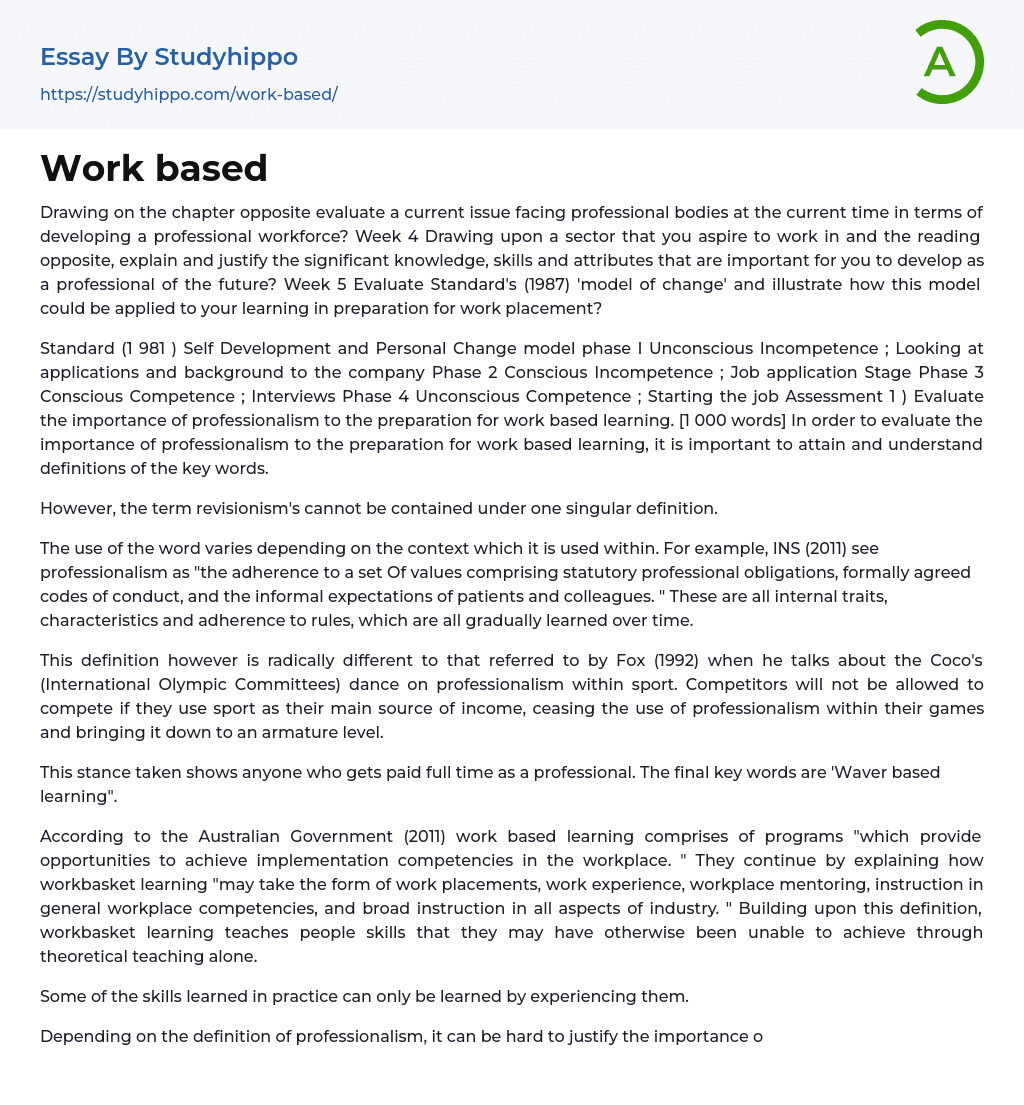The text reflects on various topics related to developing a professional workforce. In week 4, it calls for considering a current issue faced by professional bodies in this regard, drawing from the opposite chapter. Week 5 demands an explanation of important skills, attributes, and knowledge necessary for nurturing one's career in a sector they aspire to work in. The text evaluates Standard's (1987) 'model of change' and its relevance to preparing for work placement, emphasizing its various phases. Lastly, it emphasizes the importance of professionalism in work-based learning, while acknowledging the challenge of defining it, as the term revisionism has no uniform definition across different contexts.According to INS (2011), professionalism involves adhering to values such as statutory obligations, codes of conduct, and expectations from patients and colleagues. These values are internal traits and are learned gradually. However, Fox's (1992) definition of profess
...ionalism in sport is different. He refers to the Coco's dance on professionalism, where athletes are not allowed to compete if they use sport as their primary source of income. This decision brings professionalism down to an amateur level and excludes full-time professional athletes. Additionally, work-based learning, according to the Australian Government (2011), offers opportunities for individuals to acquire competencies in the workplace through programs like work placements, mentoring, instruction in workplace competencies, and broad industry instruction. Work-based learning bridges the gap between theoretical teaching and practical skills acquisition. The final key phrase is "Waver based learning."Experiencing certain skills is necessary in order to learn them. The importance of professionalism in work based learning can be difficult to justify depending on one's definition of professionalism. When individuals participate in work based learning placements during
their educational career, they typically lack experience in leisure work situations and have few qualifications. Therefore, using professional as a noun is challenging. However, professionalism can still be significant in an educational setting when used as an adjective. Acting in a professional manner can enhance employability, as employability and professionalism share similar traits. Employers seek knowledgeable, skillful, and positive individuals - all qualities that are often associated with professionalism. According to Harvey (2004), "the acquisition of attributes (knowledge, skills and qualities) that make graduates more likely to be successful in their chosen occupations" defines employability.Professionalism is crucial for success in work-based learning and job applications. According to Tortellini (2005), no leisure service can be efficient or effective without qualified professionals. Therefore, hiring professionals is essential for organizations to achieve their ambitions. Managers seek professional traits in employees. Entering the leisure industry can be daunting due to its rapid changes and the large workforce of 4 million and a Gross Value Added of E.2 billion (Selective, 2007). Falling behind is a risk, so professionalism is key.
Preparing for work-based learning in a professional manner is crucial in developing skilled and dynamic students, especially in the leisure market. According to Freeing (2004), 30% of bosses in the hospitality, leisure, travel, and tourism sectors believe that skills gaps are affecting their bottom line. Professionalism is therefore essential. Additionally, WHICH (Bibb) argues that professionals in all industries must continuously update their knowledge and skills to keep pace with the rapidly evolving economy. Career skills acquired during work-based learning can quickly become outdated; thus, acting professionally is vital for preparation. However, the effectiveness of professionalism can be questioned. The concept
of CAP highlights the significance of lifelong learning, emphasizing that practical skills and knowledge acquired over time cannot be gained solely through preparation for work. Nonetheless, reflective practitioners can still benefit from pre-work professionalism.
- Academia essays
- Higher Education essays
- Language Learning essays
- Studying Business essays
- Education System essays
- Study essays
- First Day of School essays
- Scholarship essays
- Pedagogy essays
- Curriculum essays
- Coursework essays
- Studying Abroad essays
- Philosophy of Education essays
- Purpose of Education essays
- Brainstorming essays
- Educational Goals essays
- Importance Of College Education essays
- Brown V Board of Education essays
- The Importance Of Higher Education essays
- Online Education Vs Traditional Education essays
- Academic And Career Goals essays
- Academic Integrity essays
- Brown Vs Board Of Education essays
- Distance learning essays
- Technology in Education essays
- Vocabulary essays
- Writing Experience essays
- Importance of Education essays
- Early Childhood Education essays
- Academic Degree essays
- Academic Dishonesty essays
- School Uniform essays
- Academic writing essays
- Cheating essays
- Bachelor's Degree essays
- MBA essays
- College Life essays
- Grade essays
- Diploma essays
- Phonology essays
- Sentence essays
- Filipino Language essays
- Pragmatics essays
- Millennium Development Goals essays
- History Of Education essays
- Graduate School essays
- Middle School essays
- School essays
- Special Education essays
- University essays




